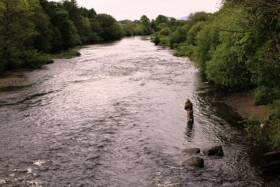Displaying items by tag: Gorey
Marine Notice: Cetacean Acoustic Monitoring at Arklow Bank and Gorey
The Department of Transport has been advised by University College Cork (UCC) that it intends to deploy hydrophones east of the Arklow Bank at four locations, and southwards to 15km off the bank and east of Gorey and Blackwater.
This marine science research aims to describe seasonal and diurnal occurrence of the cetaceans (the order of marine wildlife that comprises whales, dolphins and porpoise) present in the areas.
UCC plans to deploy four moorings with attached hydrophones on the seabed between the dates of Monday 5 and Saturday 17 February, subject to operational and weather constraints. The moorings will be fully recovered after three to four months for maintenance and then redeployed.
The hydrophones will be deployed in four locations in a latitudinal gradient, from east of the turbines at the Arklow Bank to 10km south of the bank, east of Gorey and Blackwater, Co Wexford.
A single vessel will be used for deploy the hydrophones: the Sharpshooter (callsign EI5069). Deployment operations will be conducted during the hours of daylight, during favourable weather conditions.
Throughout operations, the vessel will be displaying the appropriate lights and shapes as required under the COLREGS Rule 27(b). As Sharpshooter will be deploying survey equipment and moorings, the vessel will be restricted in its ability to manoeuvre, therefore all other vessels are requested to leave a wide berth.
Coordinates and a map of the survey areas as well as contact details can be found in Marine Notice No 05 of 2024, attached below.
River Slaney Salmon Ban Angers Gorey Anglers
#Angling - Gorey anglers have expressed ‘outrage’ over the closure of the River Slaney for salmon fishing in 2017, as the Gorey Guardian reports.
Minister of State Seán Kyne said the move was made to help replenish and conserve stocks in the Wicklow and Wexford river, where worms for bait and barbed hooks have also been prohibited for the coming year.
But Slaney River Trust members have hit out at the ban, suggesting that the absence of even catch-and-release fishing for salmon will see angling numbers decline and encourage poaching on what’s a significant resource for the South East.
73 rivers have been approved to open for salmon angling this year, as previously reported on Afloat.ie — though that figure is nine fewer than those opened to full angling or catch-and-release in 2016.
The Gorey Guardian has more on the story HERE.





























































